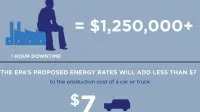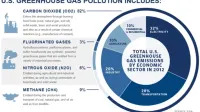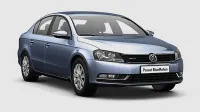Co2 Emissions
Will VW diesel scandal lead to tax evasion charges?
German prosecutors open another criminal probe into Volkswagen, this time into potential tax evasion over CO2 irregularities in about 800,000 cars in Europe.
VW engineers confess cheating to lower CO2 emissions
VW engineers admit that they cheated to lower CO2 emissions for the company's vehicles because they couldn't meet the goals set by former CEO Martin Winterkorn.
G7 leaders talk about fossil-fuel free future
Decarbonizing the transportation sector is just one part of a potential goal for the UN and the G7 leaders, who met in Germany on Monday.
Even-numbered license plates banned in Paris to reduce smog
Paris banned vehicles with even-numbered license plates yesterday to reduce record smog levels.
How VW's hyper-efficient XL1 will influence the next Golf
In 2007, the European Union mandated fleet average CO2 emissions of 158.7 g/km. For 2015, that figure will drop to 130 g/km, and the target for 2020 is an ambitions 95 g/km. Thanks to some German politicking, that target will be phased in from 2020 to 2024, but it will still apply to 80 percent of passenger cars in that first year. In US miles per gallon, that's the equivalent of going from about 35 mpg to 42 mpg to 57 mpg. The current
Doing nothing on climate change could cost auto industry millions
When it comes to climate change, the auto industry will be better served by working with the energy industry on cleaner energy plants than dealing with more and more severe weather incidents in the future. That's the finding of a new study by Business Forward, which says that supporting the EPA's new rules – which is supposed to make energy pl
EPA proposes new rules to make US power plants 30 percent cleaner by 2030
A year ago, President Obama put the electricity industry on notice and said that he would implement some sort of limits on carbon emissions. Today, the Environmental Protection Agency unveiled a proposed rule for cleaner electricity generating plants and it would go a long way towards making the "
Are hybrids more important to Nissan than EVs?
Nissan chief operating officer Toshiyuki Shiga offered an update on the automaker's "eco-targets" to further cut CO2 emissions and add 15 hybrid models by 2016. At a press conference in Yokohama, Shiga explained the company's commitment to sustainability through its Nissan Green Program 2016. "Thanks to environmentally friendly technology and new products, we are completely in line with our targets for the reduction of CO2 in the usage of vehicles,"
Should there be a fossil fuel moratorium? Some scientists say yes
Climate change was barely mentioned during October presidential debates, but that doesn't mean the public doesn't care. After all, climate change affected Hurricane Sandy, and that got some media coverage. Some analysts say climate change is just part of historic weather patterns that humans have little say over but most scientists say humans play a big part in the matter, in
Toyota animates Ha:mo mobility network
Automakers will be playing a much different role in cities in the near future, according to Toyota. Manufacturing cars and marketing them through their dealer networks may take a backseat to smart transportation and mobility. See also: Daimler's Car2go.
EU considering lowering CO2 emissions targets
One of the reasons that automakers are working so diligently on making more fuel efficient vehicles is because we're forcing them to. We, through our elected officials, have set certain standards that they have to meet in order to sell their wares. One of the strongest is the CO2 emissions limits set by the European Commission in 2008: 130 grams of CO2 per kilometer by 2015. The bad
Portugal leads Europe with lowest CO2 emissions, Sweden lands in last
The fuel efficiency of European vehicles improved in 2010, with CO2 emissions falling by 3.7 percent, according to European Union (EU) data released last Wednesday.
Study: Electric vehicles are way too dirty in China
Operating an electric vehicle in China today emits more greenhouse gases than simply driving a gasoline-fueled equivalent, according to emissions expert Juerg Gruetter of Gruetter Consulting. The reason is that, despite the country's push to promote electric vehicles, China's power grid is so overwhelmingly fed by dirty coal that recharging the battery-powered rides will release far more emissions than just putting gasoline in the tanks of the nation's 200-plus million registered vehicles.
European Union says CO2 emissions fell 3.7% in 2010
The fuel efficiency of vehicles sold in Europe in 2010 improved slightly versus those sold in 2009, according to provisional European Union data. The EU says that last year's numbers show that CO2 emissions from passenger vehicles fell by 3.7 percent, moving the average emissions down to 140 grams per kilometer.
Audi launches 99 g/km A1 1.6 TDI in Europe
German automaker Audi has launched a revised version of its A1 1.6 TDI with CO2 emissions of 99 grams per kilometer. Its 104-horsepower 1.6-liter diesel-burning engine, which is mated to a five-speed manual transmission, has undergone a slew of revisions that help slash the A1's CO2 emissions from 105 g/km down to just 99 g/km, meaning that this vehicle is now exempt from Eric Loveday



















